In this diary, I'll record our experiences, any side-effect and hopefully, come the day, our second dose and our road to a good level of immunity, how easy it is to do foreign travel, etc.
The purpose to to show that there is nothing to fear and averything to gain from this vaccine!
Saturday, 6th Feb 2021 09:50
On the way out the door we picked up letters off our doormat, from the NHS, inviting us to go online and book our anti-coronavirus vaccinations! "Hmm! I wonder if there has been a mix-up and we don't have an appointment today!"Sunday, 7 Feb 2021. 09:00
Arrived 10 minutes early for appointments booked for 12:10. Foggy day, no point in risking being late. Waited in the car until 12:00.
Read the list of questions - do you have symptoms of Covid-19? Have you any allergies? Have you ever had anaphylaxis? Are you pregnant? etc (no to all). Booked in. Gave verbal consent to have the vaccine and handed paperwork 'to give to the nurse'. Great! No mix-up! "Oh! We're having the Oxford/AstraZeneca vaccine!". Really pleased because we feel this is our local home-grown vaccine!
Stood in line for, maybe 2 minutes with bared left shoulder. Thankfully short as it was a cold day and the Village Hall was very well ventilated!
A pleasant quick chat about who was driving - you're not allowed to drive for 15 minutes! Thinks: "Hmm! That's not normally a problem when I get my annual flu jab! I wonder if that's law or just medical 'advice'! Must look that up sometime!"
"A slight scratch! You'll probably have a sore arm for a few days and might feel a bit headachey and fluey for a day or two!"
A slight scratch, more a pinch, really!
"Remember, no driving for 15 minutes, so you'll be okay after 12:15! Thank you! Bye! Enjoy the rest of your day! Follow the one-way system out of the end door!"
After sitting in the car in the car-park for a few minutes we decided to get our daily exercise and went for a walk around the adjacent allotments, then back to the car and away home, stopping off at a local convenience store to buy a few things on the way!
Feeling fine, and relieved! Now counting the days to a good level of immunity in about 3-4 weeks, apparently.
Arm feels a little bruised but unrestricted movement and no headache of flu symptoms, yet. Not much different to our routine annual flu jab or that shingles vaccine I had a few weeks before Xmas!
20:30 Feeling quite tired now but could be because I was awake early.
According to some, supposed to 'feel a bit rough' today, but nothing so far. Arm is a little stiff and still tender to touch. Feels a bit bruised. No restrictions in movement. A slight tickly cough but not anything to worry about.8 Feb, 2021 10:30
21 days to go for full anti-body production and supposedly 76% effectiveness. IOW, I'll only have a quarter the probability of catching the virus and if I do, zero probability of needing hospitalization or dying from it according to recent research. News today that AstraZeneca are reporting that a 12-week gap between first and second vaccination gives a better final antibody level than a 3-week gap. Also, preliminary results showing it may be a little less effective against a mild form of the South African varient but prevents serious illness and hospitalisation. AZ will modify the vaccine with the SA mRNA - ready for Autumn. Annual vaccinations may be necessary as virus mutates - like the annual flu jab. Although coronavirus is more stable than the flu virus, we are creating selection pressure to encourge it to mutate to overcome the antibodies the vaccinations are providing and as 'her immunity' builds up. Interesting dynamics of evolution here as we are simultaneously reducing the number of virus particles being produced, so reducing the variability in the population, but increasing the selection pressre favouring those that do have the 'right' mutations. Maybe an idea for a future blog...?
23:15: Maybe a little more tired today than normal. Arm still feeling bruised but no restrictions on movement. All seems well - and why not?
Woke up early - slight headache - maybe 'a bit fluey'?. Watched fox running around the close from my window. A sprinkle of snow - the 'Beast from the East' is back! Back to bed to keep warm. All well. Arm still feels slightly bruised when touched.9 Feb, 2021 13:00
Feel fine today. Bruising almost gone from my arm. A few light snowflakes blowing in the breeze. May go walkies later.10 Feb, 2021
A lot of alarmist talk in the news about the Oxford AZ vaccine being significanly less effective against the 'South Africa varient' but my understanding is that it is 100% effective at preventing hospitalisations and deaths. May need a booster in the Autumn and in subsequent years to keep up with mutations in the virus until we've reduced the incidence of it to very low levels in the world. The 'problem' is that as herd immunity is approaches, there is increasing selection pressure on both transmissibility AND resistance to the anti-bodies the vaccines make. Anual vaccines, like anual flue vaccines will probably become the norm. The good thing is that the mRNA technology means it is relatively easy to modify the vaccine with the latest viral mRNA. The details of manufacture, distribution and delivery won't need to change.
Arm only slightly bruised feeling when pressed. All well.11 Feb, 2021
A lot of talk in the news today about variants and how effective Oxford/AZ vaccine might be against them. General consensus seems to be that it is a little less efective against South African and Brazilian variants but still 100% effective against serious illness, hospitalisation and death. In fact, still being able to catch a mild dose of it might even result in enhanced immunity.
All well still. Vaccination site only slightly tender to touch. Despite early talk about reluctance to have the vaccine, something like 92% take-up in the over 70 age group.12 Feb, 2021
Debate now is whether it's safe to book a summer holiday abroad. The problem is, the longer we leave it the greater the demand will be when the flood is finally unleashed as lots of people now have money put aside for the holiday this year they never had last year. Can the tourist centres in Spain, France, etc, gear back up to cope?
Vaccination site barely noticeable even when pressed hard.13 Feb, 2021
The government have now managed to sow complete confusion about wisdom of booking a holiday this summer with ministers contradicting ministers. No-one is sure yet whether the compulsory quarantine period in a designated hotel, at our own cost, will be in place come July or August.
Now lookign increasingly likely that we will need a booster vaccination in the Autumn to give protection against the South African variant. Problem being that, as the number of people vaccinated worldwide increases so the probability of a novel mutation arising decreases, but the advantage (for the virus) of a mutation which evades the antibodies increases. Also, a suggestion in the news yesterday that the 'Kent' variant could have arisen in a single individual. If so, this shows how a mutation which improves the virus' transmissibility can quickly spread in the virus gene pool.
15 days to go for maximum protection from a single injection. No news yet of a second injection...This from a post in The Conversation yesterday.
According to data from the Oxford/AstraZeneca vaccine group, released as a preprint with The Lancet last week and yet to be peer reviewed, its vaccine is showing signs of reducing transmission. The shot was associated with a 67% reduction in transmission among vaccinated volunteers in clinical trials in the UK.
It’s early days, but authors of the study suggest the vaccine may have a “substantial” effect on reducing rates of transmission in the future.
In saying that, preliminary data suggest it offers minimal protection against mild or moderate illness caused by the South African variant.
7 days post vaccination. no discomfort at vaccination site and no adverse reactions. If increase in immunity is linear over 22 days, then should be about 25% effective at the moment...14 Feb, 2021
Vaccination program on target so optimistic talk in the media about returning to normality and ending lockdown soon. Xoncern still about th South African strain - is Oxford/AZ effective against it? If so, to what extent?
We will delay booking a holiday for a few weeks in any case.
A couple of interesting articles in New scientist on Covid-19...
The 5 best things you can do to boost the chance of a vaccine working
- Stress. Avoid it.
Further findings support these initial hints that stress affects our immune response to vaccines: in older people, a positive mood on the day of vaccination is associated with a higher antibody response to a flu shot.- Sleep. Get at least 7 hours a night on two nights before injection.
Aric Prather at the University of California, San Francisco, looked at sleep over two weeks, pinpointing sleep duration on the two nights before flu vaccination as the best predictor of the immune response several months later.- Social support.
Alongside stress and sleep, you may want to try to mitigate the effects of isolation. Even in young, healthy people, feelings of loneliness have been associated with a lower antibody response to flu vaccination.- Alcohol. Moeration.
Anna Popova, the head of the Russian Federal Service for Surveillance on Consumer Rights Protection and Human Wellbeing, sparked debate advised Russians to quit alcohol two weeks before their first coronavirus vaccine and to abstain until three weeks after their booster shot.Others offer different advice:Alexander Gintsburg, head of the Gamaleya National Center of Epidemiology and Microbiology in Moscow, which developed the Sputnik V vaccine, said that drinking alcohol after getting a coronavirus jab can impair the immune response and could even render the vaccine ineffective. Contrary to Popova, though, he recommended refraining from alcohol for three days after each injection.However:A study in macaques shows that moderate alcohol consumption – the equivalent in people of up to two units a day – actually appears to create a more robust response to vaccination using a member of the virus family that causes smallpox in humans.I'll go with the latter!- Excercise. Get enough.
Several studies support this. For instance, people who already have an active lifestyle over the age of 62 have higher antibody responses to flu vaccination than those who are sedentary. People who received a tetanus vaccination after completing a marathon had a higher antibody response than non-runners. And women who used an exercise machine in the 45 minutes before flu vaccination had a higher antibody response a month later than those who did no exercise.And more...
All well still.15 Feb, 2021
The government have reached their target of 15 million vaccination of the most vullnerable groups, but no figures yet of the uptake. Presumably, vaccines will now be offered to those under 65.
No doubt Johnson will be claiming credit for this achievement of medical science and our socialised NHS.
The figures today look encouraging as numbers continue to fall.
Meanwhile, a group of right-wing Tories are agitating for a commitment to have all restrictions lifted by mid-May, in advance of what the science may be showing closer to the time.
The question now is, how long does it take to reach full protection after the second dose? The answer seems to be about 2 weeks. So, if we have the second dose after the 12 weeks as planned (1 May, 2021) this should mean we are at peak protection by mid-May!16 Feb, 2021
Time maybe to start looking seriously at holiday options!
Looking whistfully at some gites in and around Perpignan, Languedoc-Roussillon, France. Hire a car from Paris, drive south to the Auverne, spend a few days there then drive down to Perpignan, possibly via Montpellier or Narbonne. Stay for a couple of weeks with trips to Andora and Spain, then drive back via Toulouse, Bordeaux and Chatres... One can but dream!
Interesting article in The Conversation today about why the sudden proliferation of more infectious variants of the SARS-CoV-2 virus. Obvious really. With more people being infected worldwide there are trillions more virus particles being produced every hour, so the chance of a beneficial mutation (from the virus point of view) increases hugely. Even the 1 in a billion chance mutation will happen a thousand times every few hours. It only needs one of those to out-compete its 'normal' variants for new humans to infect by having a slightly higher 'R' number, and we have the potential for exponential growth, just as we saw in UK from the end of December with the 'Kent' variant.There are several reasons for this, including the continued exponential rise in cases globally. Every COVID-19 case gives the virus a chance to mutate, and if the number of infections continues to rise, more new variants are likely to emerge.At the current rate of fall in the number of people in hospital, down by 1000+ a day, it is possible that the hospitals could be clear within 3 weeks!
A lot of talk in the media today about easing the lockdown restrictions. Government need to see much more clear data on the effectiveness of the vaccination program. So far, over 15 million people vaccinated but no clear signs of deaths and hospitalisations reducing. Early days yet.18 Feb, 2021
All the talk in the media today is about a fall in the new infection numbers and when, how and how quickly to end the lockdown. Schools need to re-open soon but the stats show that the largest group of new infections are amongst children of school age. Children tend not to become very ill with Covid-19 but can infect others and will act as sources of new variants.19 Feb, 2021
From today's Guardian:Covid infections have fallen by two-thirds in a month in England but the virus is now spreading most among primary-age children and young people, research suggests.
The React 1 study from Imperial College London points to the third national lockdown having significantly curbed the spread of the coronavirus despite the emergence of new variants.
Prevalence remains high however, with about one in 200 people infected with Covid between 4 and 13 February, compared with about three times that number between 6 and 21 January, the interim findings showed.
[...]
The population surveillance study, which has yet to be peer reviewed, suggests that infections are halving every 15 days. If the trend is similar to that for infections it could take more than six weeks for cases to fall below 1,000 a day – from 12,718 on Wednesday and 9,236 on Tuesday – as advocated by the former health secretary Jeremy Hunt before restrictions can be significantly lifted.
Elliott said infections had dropped but prevalence remained higher than when the study began in May 2020. “The last time we saw a prevalence of this rate was around late September last year,” he said.
Slightly disappointing figures for daily new cases today as it remains stubournly above 12,000. Seems to have plateaued at the level it was at at the end of November, 2020. Deaths are significantly down, however.
Latest R number calculated to between 0.6 and 0.9.
From the BBC:The ONS results, based on tests from people whether or not they had symptoms, suggest:In England, there is some regional variation in the infection rate, although it is decreasing in all areas.
- One in 115 people in England has the virus (compared to one in 80 the week before)
- In Northern Ireland, it is one in 105 (compared to one in 75 previously)
- In Wales, it is one in 125 (compared to one in 85 before)
- In Scotland, it is one in 180 (compared to one in 150)
North-west England had the highest proportion of people of any region in England likely to test positive for coronavirus - at around one in 85 people.
There has been a "strong decline" in levels of coronavirus infections in England since January, say scientists tracking the epidemic.
Imperial College London's React study found infections have dropped by two-thirds across England since lockdown began, with an 80% fall in London.
But virus levels are still high, with one in 200 testing positive between 4 and 13 February.
This is similar to levels seen in late September 2020.
Although these are interim findings, based on more than 85,000 swab tests from randomly selected people, they suggest social distancing and restrictions are having an impact.
A further 12,057 Covid cases have been reported in the UK, and there have been another 454 deaths within 28 days of a positive test. Last Thursday, 13,494 cases and 678 deaths were reported.
The total number of people to have received the first dose of vaccine now stands at 16,423,082 - a daily rise of 482,110.
But more than 20,000 Covid patients are currently in hospital in the UK, and although new daily cases and hospital admissions are falling, they are still relatively high.
The React report found falls in infections across all age groups, with 18 to 24-year-olds and five to 12-year-olds currently having the highest virus levels - although still below 1%.
It estimates the over-65s have the lowest levels of virus at 0.3%.
More young children have been attending school during this lockdown than in the last one, which may have helped keep virus levels slightly higher in these age groups.
14 days post-jab! So, assuming antibody production increase is linear, we should be about 45% protected now. Absolutely no signs of any ill-effects or reactions. No tenderness at the injection site.21 Feb, 2021
An interesting resume of how the coronavirus pandemic has affected Europe by the BBC. Especially germain to us as we consider our summer plans:Spain's lockdown was among the harshest in Europe, says Nekane Balluerka Lasa, professor of behavioural sciences methodology at the University of the Basque Country. Isolation was particularly hard for older people and lower-income families, especially if there was no nuclear unit. Spaniards are used to social interaction. Infections came down, but the economic cost was very high and the main lesson was the impact on people's mental health. Maybe that explains why it wasn't possible to keep it going. Our study found that 46% of people felt grave psychological distress.
Italians were initially frightened into uncharacteristic obedience, says BBC Rome correspondent Mark Lowen. They were the first to be crushed by the virus, the first to see intensive care units close to collapse, and friends and family dying. Very widespread respect for restrictions began to change with the second wave, with some protests against renewed lockdowns, given the fear and fatigue.
France finally goes digital, by Lucy Williamson, BBC Paris correspondent. Until the second lockdown last autumn, life in France often evoked an age of typewriters and triplicate. Despite an annual turnover of almost €2.4tn (£2.1tn; $2.9tn), two-thirds of small businesses didn't operate online, and the websites of even vast iconic department stores like Galeries Lafayette or BHV offered little more than an address and opening hours, plus an image or two of some fancy shoes. Now, everything from cafe meals to tax payments and residency card applications can be made online and the department stores have slick websites. Boosting the digital economy has been a key goal for President Emmanuel Macron; the pandemic a strange ally in pushing France online.
The numbers continue to fall. New cases below 10,000 per day for the first time since 28 Sep, 2020. Deaths down to 215 (admittedly for a Saturday - weekend figure is always low due to delayed reporting), and patients in hospital down to mid-December levels.22 Feb 2021
Government is claiming the fact that new cases are falling faster than in the first wave is evidence that vaccination is reducing transmission rates.
The government has announced a revised plan to have all people in the top 9 priority groups and all over 50 vaccinated by the end of April and all adults by the end of July. Oder of priority for those under 50 has yet to be determined.
Lockdown to be eased slowly and according to progress with vaccines. The thinking is that becoming infected while your body is still building up its antibodies will lead to more resistant strains emerging, whereas if your body can hit the virus hard early on, there will be less chance of resistance evolving.
The intersting thing is how a clear understanding of evolution is essential in formulating these policies.
Reports in the media this morning that preliminary resuls from a study in Scotland has shown the the Oxford AZ vaccine has 'spactacular impact' on preventing serious illness:The first results of the UK vaccination programme suggests it is having a "spectacular" impact on preventing serious illness.Later: Johnson has now set out a plan for ending the lockdown and all social restrictions by 21 June, if conditions are met.
Research led by Public Health Scotland found in the fourth week after the first dose, hospitalisations were reduced by 85% and 94% for the Pfizer and AstraZeneca jabs respectively.
It is the first sign of the real world impact of vaccination in the UK.
Figures for England are expected to be released later.
Among the over 80s, there was an overall 81% reduction in the numbers admitted to hospital.
The researchers did not look at the impact on transmission - whether people who were vaccinated passed it on - or whether immunity waned over time.
The preliminary data from the EAVE II project covers 1.14 million vaccinations given in Scotland between 8 December and 15 February.
The study looked at the numbers being admitted to hospital with Covid among this population and compared it to those admitted who were not vaccinated.The announcement was followed by an immediate surge in bookins for foreign holidays, but we have decided to be cautious and wait a while to see how things work out in Europe.* Earlest dates.
- 8 March. Schools open. Outdoor after-school sports allowed.
Two people (not from same household) allowed to sit together outdoors
Care home residents allowed one regular visitor.- 29 March. Six people from two households allowed to meet outdoors.
Outdoor sports facilities open. Organised sport allowed.
Travel outside local area allowed.- 12 April*. Non-essential retail and personal care open.
Hospitality outdoors open.
Indoor leisure (gyms, swimming pools) open.
Self-contained holiday accomodation open. (single household).- 17 May*. Outdoors most social contact rules lifted.
Six people or two households can meet indoors.
Indoor hospitality and hotels open.- 24 June*. All legal limits on social contact removed.
Hope to reopen final closed sectors of the economy.
More optimistice news today about a substantial fall in deaths in care homes and amongst the over 80s generally, pointing to the success of the vaccines.24 Feb 2021
Daily new cases below 10,000 for the first time sine early October 2020.
Seems probable that we will now need a regular booster each autumn to keep up with mutations - like the flu jab. May be a conbined flu/covid jab.25 Feb 2021
Slightly dsapointing numbers today as recorded new cases rose slightly on previous day but still below 10,000, just. But deaths within 28 days of a positive test are still well down at 442.
All the talk in the news media now is about lifting restrictions on social contact and economic recovery. Johnson & Johnson have announced high level of protection against South African and Brazilian variants with their new sing-dose vaccine. No plans for it to be used in UK as yet.26 Feb 2020US regulators have found the single-shot Johnson & Johnson coronavirus vaccine is safe and effective.Of special relavance to us and our travel plans is this news item:
It paves the way for it to become the third Covid-19 vaccine to be authorised in the US, possibly within days.
The vaccine would be a cost-effective alternative to the Pfizer and Moderna vaccines, and can be stored in a refrigerator instead of a freezer.
Trials found it prevented serious illness but was 66% effective overall when moderate cases were included.
The company has agreed to provide the US with 100 million doses by the end of June. The UK, EU and Canada have also ordered doses and 500 million doses have also been ordered through the Covax scheme to supply poorer nations.
Source: BBCLet's hope those restrictions are removed before we go there, if that's where we go.France: New lockdown on the French Riviera
France has a curfew between 18:00 and 06:00. Shops and businesses must be closed, and everyone must be at home.
Schools are open with extra testing in place.
France closed its borders to all non-EU countries from 31 January, although hauliers are exempt.
Bars, restaurants, theatres, cinemas and ski resorts remain shut.
In addition to nationwide restrictions, lockdown measures will be put in place in parts of the French Riviera, including Nice and Cannes, from 18:00 on 26 February to 06:00 on 1 March. People will be allowed to leave their homes for essential reasons only, and will need written permission stating the reason for being out.
Source: BBC
Slighty disappointing figues today as similar to yesterday. Still below 10,000. Deaths are well down.
Today's figures are lookign much better - down almost 2,000 on previous 2 days and deaths now below 400. Difficult to tell yet a while what impact vaccines are having as most people in hospital/dying would have been infected before a significnt number of people had been vaccinated and had had time for antibodies to reach their maximum levels. But all the figures are heading in the right direction.27 Feb 2021
UK alert level officially reduced fron 5 (highest) to 4, but no relaxation of social distancing regs., etc, yet.Why has the alert level gone down?
The level has been changed because the number of people in hospital is falling and "the threat of the NHS and other health services being overwhelmed within 21 days has receded".
The decision was announced in statement by the UK's chief medical officers and NHS England's national medical director.
Level four means coronavirus transmission remains "high," and health services are still "under significant pressure with a high number of patients in hospital".
"Transmission rates, hospital pressures and deaths are still very high," the statement added.
A change in alert system does not automatically mean restrictions can ease, but it helps to inform government decisions on lockdown rules.
Source: BBC
3 weeks now since our jabs, so protection should be at about 64%.28 Feb 2021
From this weeks News Scientist:Finally, some good news. The first real-world studies on the effectiveness of two coronavirus vaccines have shown they are performing “spectacularly well”.So, on that basis, in another two weeks we'll be 94% protected against hospitalisation.
In the first of two results announced today, one dose of vaccine cut hospitalisations due to covid-19 in Scotland by more than 85 per cent.
The research, led by five Scottish universities and Public Health Scotland, involved 99 per cent of Scotland’s 5.4 million people, 1.1 million of whom received a vaccine between 8 December and 15 February.
By the fifth week after receiving their first dose, those who received the Oxford/AstraZeneca jab had reduced their risk of hospitalisation by 94 per cent, and those who received the Pfizer/BioNTech vaccine by 85 per cent.
Today's figures show good progress in reducing the numbers of new infections, hospitalisations and deaths.
More vey good figures today.
However, the BBC are runnign a story that the Brazilian 'variant of concern' has been found in England and Scotland:A coronavirus "variant of concern" first detected in Brazil has now been found in the UK.Over 20 million people in the UK have now had a coronavirus jab, and letters inviting those aged over 60 are beign sent out to arrive next week.
Three cases have been detected in England and separately three in Scotland.
In England, officials are still trying to track down one of those who tested positive for the new variant.
Meanwhile the three Scottish residents had flown to Scotland from Brazil via Paris and London, the Scottish government said.
Experts believe this variant (P1), first detected in travellers to Japan from Manaus in northern Brazil in January, could be more contagious.
How worrying is the Brazil coronavirus variant?
In England, the first two cases were from the same household in South Gloucestershire, with a history of travel to Brazil, but the third is not linked, Public Health England (PHE) said.
The whereabouts of that third person are still not known, as PHE says they did not complete their test registration card so follow-up details are unavailable.
Officials are asking anyone who took a test on 12 or 13 February and who has not received a result or has an uncompleted test registration card to come forward immediately.
Testing is now being ramped up in South Gloucestershire, with people living in five postcode areas invited to get tested even if they do not have symptoms. The postcodes fall within Bradley Stoke, Patchway and Little Stoke.
Scotland cases
With regards the three cases in Scotland, the government said other passengers, who were on the same flight from London to Aberdeen, are now being contacted.
"The identification of this new variant is a concern but we are taking every possible precaution," said Scottish Health Secretary Jeane Freeman.
"We have identified these cases thanks to our use of advanced sequencing capabilities which means we are finding more variants and mutations than many other countries and are therefore able to take action quickly."
The Scottish government said this variant has been been designated "of concern" as it shares some important mutations with the variant first identified in South Africa. Research suggests some vaccines may be less effective against the South Africa variant.










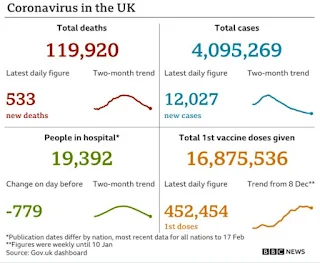
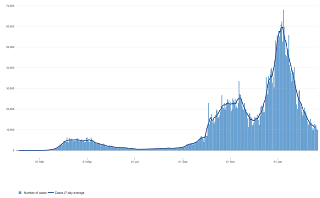






























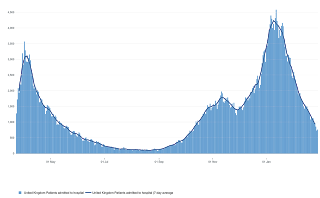





































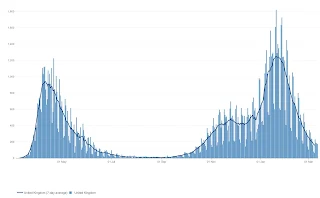






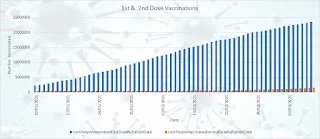





































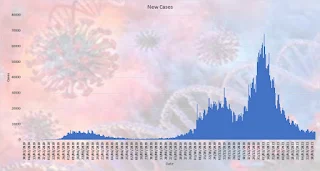




















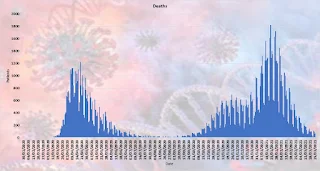
















No comments :
Post a Comment
Obscene, threatening or obnoxious messages, preaching, abuse and spam will be removed, as will anything by known Internet trolls and stalkers, by known sock-puppet accounts and anything not connected with the post,
A claim made without evidence can be dismissed without evidence. Remember: your opinion is not an established fact unless corroborated.